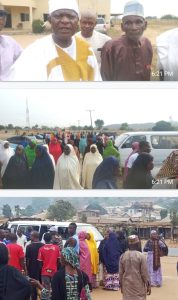In a dramatic turn of events, residents of KotonKarfi descended upon the State High Court Lokoja today, demanding a fair hearing regarding the alleged dethronement of their traditional leader, Ohimegye Abdulrazaq Gambo Sani Isa-Koto, on January 8, 2024.
The crowd, comprising individuals of all ages including the elderly, youth, and vulnerable who couldn’t secure transportation to Lokoja, traveled in vehicle booths to attend the court proceedings out of their unwavering support for Ohimege Abdulrazaq Gambo Sani Isa-Koto.


At the heart of the matter lies the dispute initiated by plaintiff Saidu Akawu Salihu, who, due to unforeseen circumstances, failed to file a defense as the case was slated to commence on February 8 but faced delays.
The controversy deepens with the release of a statement by Comr. Adazaki M.S. Jibril secretary to the Igu Conscience Repository Group, vehemently condemning what they term as a “fallacious coronation day speech” delivered by Saidu Akawu Salihu (SAS) on January 24, 2024.
According to the group, the removal of H.R.M. Alhaji Abdulrazaq Gambo Sani Isakoto and the subsequent appointment of Saidu Akawu Salihu as the Ohimege Igu-Koton-Karfi represent a grave departure from centuries-old cultural norms.
The statement challenges the legitimacy of the process that led to Salihu’s purported ascension, asserting that it lacks transparency and authenticity.
It alleges political manipulation and executive overreach on the part of former Governor Yahaya Bello, accusing him of facilitating a scheme detrimental to the cultural heritage and collective conscience of the people of Igu-Koton-Karfi.
Furthermore, the group refutes claims made in Salihu’s speech, disputing the involvement of kingmakers in his selection and emphasizing the traditional and ancestral legitimacy of H.R.M. Alhaji Abdulrazaq Gambo Sani Isakoto’s reign.
They underscore a history of rejection of Salihu’s candidacy by the community and stress the sanctity of due process in matters of traditional leadership.
In closing, the statement calls for calm among the populace, expressing confidence in the rectitude of their cause and invoking divine justice in the face of perceived injustice.
As the legal battle unfolds and tensions simmer in KotonKarfi, the fate of its traditional leadership hangs in the balance, with broader implications for the region’s cultural identity and governance.
